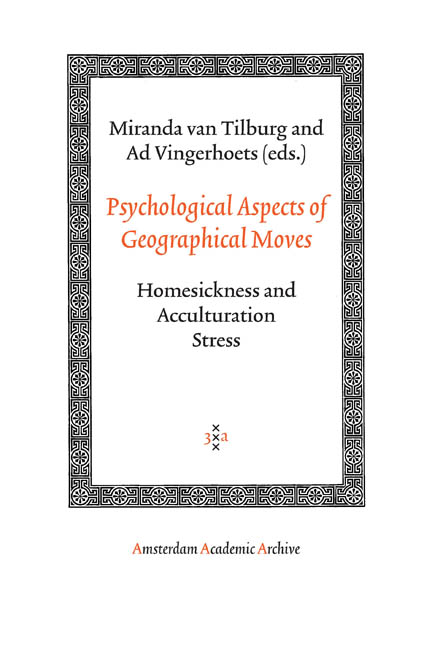Book contents
- Frontmatter
- Preface
- Contents
- Contributors
- 1 The Homesickness Concept: Questions and Doubts
- 2 Culture Shock, Homesickness, and Adaptation to a Foreign Culture
- 3 The Psychological Context of Homesickness
- 4 Geographical Moves and Psychological Adjustment
- 5 Homesickness and Acculturation Stress in the International Student
- 6 Psychological and Psychosocial Adjustment of Migrants: Families in a Changing Environment
- 7 Individual Differences in Acculturative Stress Reactions: Determinants of Homesickness and Psychosocial Maladjustment
- 8 The Cry for the Lost Placenta: Cultural Bereavement and Cultural Survival among Cambodians who Resettled, were Repatriated, or Stayed at Home
- 9 Children's Coping with Homesickness: Phenomenology and Intervention
- 10 Homesickness after Relocation during Early Adolescence
- 11 Personality, Temperament, and Homesickness
- 12 Homesickness, Personality and Personality Disorders: An Overview and Therapeutic Considerations
- 13 Health Issues in International Tourism: The Role of Health Behavior, Stress and Adaptation
- 14 Development of Psychopathology in International Tourists
- Miscellaneous Endmatter
7 - Individual Differences in Acculturative Stress Reactions: Determinants of Homesickness and Psychosocial Maladjustment
Published online by Cambridge University Press: 23 January 2021
- Frontmatter
- Preface
- Contents
- Contributors
- 1 The Homesickness Concept: Questions and Doubts
- 2 Culture Shock, Homesickness, and Adaptation to a Foreign Culture
- 3 The Psychological Context of Homesickness
- 4 Geographical Moves and Psychological Adjustment
- 5 Homesickness and Acculturation Stress in the International Student
- 6 Psychological and Psychosocial Adjustment of Migrants: Families in a Changing Environment
- 7 Individual Differences in Acculturative Stress Reactions: Determinants of Homesickness and Psychosocial Maladjustment
- 8 The Cry for the Lost Placenta: Cultural Bereavement and Cultural Survival among Cambodians who Resettled, were Repatriated, or Stayed at Home
- 9 Children's Coping with Homesickness: Phenomenology and Intervention
- 10 Homesickness after Relocation during Early Adolescence
- 11 Personality, Temperament, and Homesickness
- 12 Homesickness, Personality and Personality Disorders: An Overview and Therapeutic Considerations
- 13 Health Issues in International Tourism: The Role of Health Behavior, Stress and Adaptation
- 14 Development of Psychopathology in International Tourists
- Miscellaneous Endmatter
Summary
Cultural adaptation and stress
Previous research findings (Berry, 1976, 1988; Berry et al., 1976; 1987; Schmitz, 1992b, 1994a; Zheng & Berry, 1991) have shown that the immigrants may experience their efforts to acculturate as stressful. An immigrant is confronted with a variety of problems, such as maintenance or change of his own cultural identity, and dealing with conflicts between different systems of values, beliefs and behavior, namely those of the mainstream society, those of his own ethnic group, and those belonging to his own personal sphere. In addition, an immigrant has to solve problems such as housing, finding adequate nutrition, often acquiring a new language, realizing his or her traditional religious practices, finding a job, dealing with immigration and other public authorities of the host society, adjusting to a different educational system, initiating new social contacts, etc. In particular the first months of an immigrant's life in a new society, while he is trying to find his way to acculturate, are experienced as stressful because adequate acculturation strategies have not yet been developed.
Stress reactions of immigrants differ in quality and intensity. The following types of typical acculturative stress reactions are distinguished in the literature (Berry et al., 1987; Schmitz 1994a, 1995): (1) feelings of distress; (2) homesickness; (3) depressive reactions, going along with alienation and hopelessness; (4) psychosomatic complaints, vulnerability to diseases; and (5) psychosocial maladjustment, psychopathic behavior.
In this chapter the following types of reactions to acculturative stress will be discussed in more detail: homesickness, depression, and psychopathic behavior. The investigation of homesickness as an indicator of reactions to acculturative stress is of great scientific and clinical interest, since this reaction is more frequently found among immigrants and more closely related to acculturation processes than the other stress reactions.
According to Berry and coworkers (1987) extent and phenotype of acculturative stress reactions vary with the degree of stress experienced by an immigrant, the number of stressors, and the extent of acculturation experience. The relationship between these components is influenced by a number of factors which can be regarded as moderator variables, such as mode of acculturation, phase of acculturation, nature of larger society, characteristics of acculturating group and, finally, characteristics of acculturating individual.
- Type
- Chapter
- Information
- Psychological Aspects of Geographical MovesHomesickness and Acculturation Stress, pp. 91 - 104Publisher: Amsterdam University PressPrint publication year: 2006



